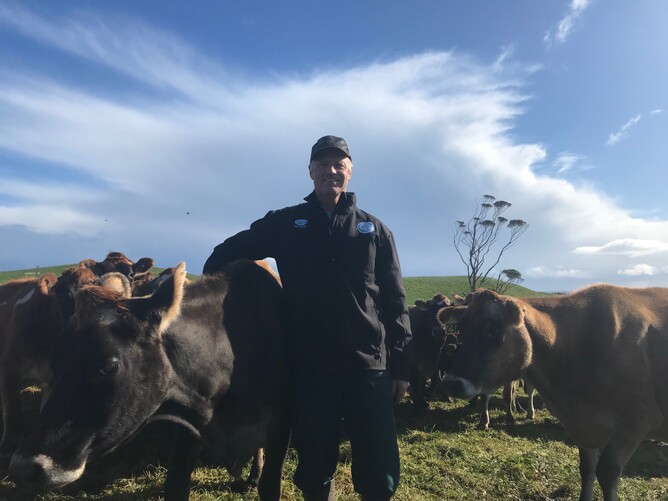It’s three months away but New Zealand dairy farmers are already preparing for the impact of Fonterra’s new fat evaluation index (FEI) grading system, which comes into effect on September 1.
Fonterra established the FEI test to measure the fat composition in the cow’s milk it collects, to ensure it is suitable for manufacturing products that meet customer specifications.
The use of palm kernel expeller (PKE) as a supplementary feed has been identified as a key influencer on high FEI levels in dairy milk. A by-product of the palm oil extraction process from the fruit of the palm, PKE has become increasingly popular as a feed option in dairying, due to its relative low cost. However, high use of PKE can impact the fatty acid profile of milk, and has led to manufacturing challenges for Fonterra with certain products.
From March 2017, Fonterra’s FEI test was rolled out nationwide and since last May farmers have been able to view their FEI results and take steps to improve poor test results.
From September 1 this year, farmers suppling milk with higher-than-acceptable levels of FEI will incur demerits and financial penalties.
“For many farmers FEI won’t be an issue, but farmers who use a lot of PKE will have to change their feed options, to mitigate or avoid penalties,” says Daniel Calcinai, general manager of New Zealand-based national feeds company GrainCorp Feeds.
“The FEI test analyses the milk and if the levels are above a certain threshold during the grading process then the farmer is penalized – in some cases, up to 20 per cent of the value of that day’s milk,” says Calcinai.
The FEI grading framework is on an A-B-C-D scale, with A grade milk meeting requirements, a B grade meeting requirements but approaching the threshold limit (alert), a C grade exceeding threshold limits (2 demerits and 10 per cent deduction per collection day) and a D grade well in excess of threshold limit (with 4 demerits and 20 per cent deduction per collection day).
GrainCorp Feeds has been working with farmers to plan alternative feed strategies to improve their FEI grading and avoid demerits and penalties.
“We have a large a range of supplementary feed options and our team can meet with farmers to plan the best feed strategy to suit their farm situation,” says Calcinai. “We’ve worked closely with those wanting to improve their FEI grading results, and have had some great success.”
Taranaki farmer Matthew Grayling has been preparing for the introduction of the FEI grading system. Based on a 200 hectare farm at Okato, Grayling milks 500 dairy cows across two herds, 300 Jerseys and 200 Friesians. He says he has been “mixing up” his feed options, with the help of GrainCorp Feeds, to understand the impact on his cows’ milk, and to improve his overall FEI grading.
After feeding his stock a small amount of PKE as supplementary feed at the end of April 2018, Grayling was shocked to find his farm’s milk had received an FEI grade of ‘D’. “It was just two to three kilograms (per cow) of PKE, which was a little concerning. A ‘D’ is a 20 per cent penalty, and I felt we couldn’t afford to be in that range.”
At that time of year, it would have cost $700 a day, Grayling estimates, “and even more at the peak of the season”.
He dried his cows off, and come spring he decided to tweak his feed options, based on advice from his GrainCorp representative Darrel McCracken.
Using ProCow30 as a base (a blend of PKE, minerals and 30 per cent molasses), we added 30 per cent soya hull to the feed, which brought his FEI grade back to an A, says Grayling.
“Dealing with the FEI grading system is going to be a challenge and difficult for some farmers,” says Grayling. “To keep producing quality milk we need to manage our input feed carefully. If we want to add supplement feed we have to be smarter in how we do it.”
GrainCorp Feeds has access to a wide range of exclusive, highly nutritional feeds as well as competitively priced commodity feeds. These feed options can be blended at rates required to meet specific herd and budget requirements. “We’ve found that altering the mix of dry feeds can dilute the impact,” says Calcinai. “For those who may use higher levels of PKE during certain parts of the season, blending with a liquid feed such as molasses is a very good option. Not only will it help reduce FEI levels but we have seen it improve production and help enhance the utilisation of other feeds. What’s more, it is safe to feed ad-lib and can be fed through existing bulk PKE feeding systems”
In January GrainCorp Feeds began offering molasses through its national supply chain, and there has been a lot of interest in that, particularly with PKE/Molasses blends says Calcinai. “We’ve found that blending molasses with PKE up to 30 per cent has helped farmers reduce FEI significantly over a short period of time. Adding molasses is not only helpful in reducing FEI, but is a really high quality feed for dairy cows.”
Calcinai says molasses is the “next lowest cost feed to PKE” that farmers can get, so it also makes sense from a financial point of view. “If a farm is set up to bulk feed, it’s definitely a viable option to consider adding molasses to mitigate FEI risk and get results,” says Calcinai.
The company has distribution centres across New Zealand, including ISO-accredited liquid storage facilities at Tauranga, New Plymouth, Napier, Bluff and Timaru, which means farmers around the country are able to get delivery of products such as molasses quickly and efficiently.
For those attending Fieldays at Mystery Creek this year, GrainCorp Feeds will be on site PB 27, 29 and 31 in the main pavilion from June 13 to 16. Free, expert advice is available, and all visitors will receive a free licorice sample bags. Those who sign a feed contract on site go into a draw for a chance to win a prize pack worth more than $10,000.
For those not at Fieldays, but wanting to talk more about alternative feed strategies, call 0800 300 313.

